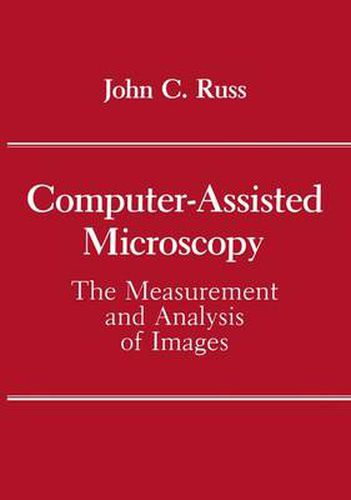Readings Newsletter
Become a Readings Member to make your shopping experience even easier.
Sign in or sign up for free!
You’re not far away from qualifying for FREE standard shipping within Australia
You’ve qualified for FREE standard shipping within Australia
The cart is loading…






This title is printed to order. This book may have been self-published. If so, we cannot guarantee the quality of the content. In the main most books will have gone through the editing process however some may not. We therefore suggest that you be aware of this before ordering this book. If in doubt check either the author or publisher’s details as we are unable to accept any returns unless they are faulty. Please contact us if you have any questions.
The use of computer-based image analysis systems for all kinds of images, but especially for microscope images, has become increasingly widespread in recent years, as computer power has increased and costs have dropped. Software to perform each of the various tasks described in this book exists now, and without doubt additional algorithms to accomplish these same things more efficiently, and to perform new kinds of image processing, feature discrimination and measurement, will continue to be developed. This is likely to be true particularly in the field of three-dimensional imaging, since new microscopy methods are beginning to be used which can produce such data. It is not the intent of this book to train programmers who will assemble their own computer systems and write their own programs. Most users require only the barest of knowledge about how to use the computer, but the greater their understanding of the various image analysis operations which are possible, their advantages and limitations, the greater the likelihood of success in their application. Likewise, the book assumes little in the way of a mathematical background, but the researcher with a secure knowledge of appropriate statistical tests will find it easier to put some of these methods into real use, and have confidence in the results, than one who has less background and experience. Supplementary texts and courses in statistics, microscopy, and specimen preparation are recommended as necessary.
$9.00 standard shipping within Australia
FREE standard shipping within Australia for orders over $100.00
Express & International shipping calculated at checkout
Stock availability can be subject to change without notice. We recommend calling the shop or contacting our online team to check availability of low stock items. Please see our Shopping Online page for more details.
This title is printed to order. This book may have been self-published. If so, we cannot guarantee the quality of the content. In the main most books will have gone through the editing process however some may not. We therefore suggest that you be aware of this before ordering this book. If in doubt check either the author or publisher’s details as we are unable to accept any returns unless they are faulty. Please contact us if you have any questions.
The use of computer-based image analysis systems for all kinds of images, but especially for microscope images, has become increasingly widespread in recent years, as computer power has increased and costs have dropped. Software to perform each of the various tasks described in this book exists now, and without doubt additional algorithms to accomplish these same things more efficiently, and to perform new kinds of image processing, feature discrimination and measurement, will continue to be developed. This is likely to be true particularly in the field of three-dimensional imaging, since new microscopy methods are beginning to be used which can produce such data. It is not the intent of this book to train programmers who will assemble their own computer systems and write their own programs. Most users require only the barest of knowledge about how to use the computer, but the greater their understanding of the various image analysis operations which are possible, their advantages and limitations, the greater the likelihood of success in their application. Likewise, the book assumes little in the way of a mathematical background, but the researcher with a secure knowledge of appropriate statistical tests will find it easier to put some of these methods into real use, and have confidence in the results, than one who has less background and experience. Supplementary texts and courses in statistics, microscopy, and specimen preparation are recommended as necessary.